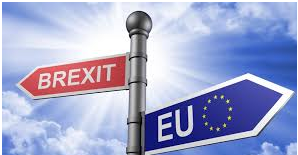
Table of Contents
With French presidential elections out of the way, expect further clarity on Brexit and more competition from French banks.
Last week the debate across the channel about how the U.K. and the EU should best engage on the Brexit process could be heard at near DEFCON 1 levels.
Countering European Commission president Jean-Claude Junker’s contention that "Brexit cannot be a success," U.K. Prime Minister Theresa May warned, "I will be a bloody difficult woman."
It is hard to avoid the impression that some of this display was posturing toward the rest of Europe—and French voters in particular—to emphasize that leaving the EU is best avoided.
Exit Frexit
With Emmanuel Macron's resounding victory in the French presidential election, the prospect of Frexit is off everyone's mind—at least for the next 5 years. And there is not another major electoral trap within the EU in the next 1 to 2 years, as German voters will head to the polls this fall and appear likely to vote for some version of mainstream, pro-EU political continuity.
While there will still be some need for political posturing in the U.K. ahead of the British elections, it is fair to assume that the U.K.-EU discussion will become more business-focused. In the coming months, the discussion will focus on the practical questions of Brexit and the impact on companies.
The main question will be how companies should organize their businesses, including:
- recruitment of EU nationals in the U.K.
- the provision of cross-border financial services
- organizing cross-border supply chains that may no longer enjoy complete freedom of trade in goods and services
Paris Back in the Game
A second immediate implication of the French election is that financial services providers and their clients should find that "Paris is back in the game" and poised to pick up business from providers that are moving some of their operations from the U.K. to continental Europe.
The public announcements from firms including Goldman Sachs, J.P. Morgan and UBS have so far clearly favored Frankfurt, as few banks would have ventured to staff up in Paris with the prospect of an extreme left or extreme right government. But with Macron's background, it is fair to assume there will be an early focus in his administration to attract more of the "Brexit crowd" to Paris by relaxing labor market rules, taxation and other regulations that have acted as a drag on Paris' attractiveness for financial services providers.
Furthermore, the major French banks are showing stronger business momentum than most of their European peers, as illustrated in particular by the first quarter results of BNP Paribas.
This is also supported by the strong business momentum among corporates toward BNP Paribas, according to our latest corporate banking research , which shows that a net 8% of major European corporates expect to increase business with the bank. Only Santander matches this scores with a net 9%, while the remaining Top 20 European corporate banks achieve scores ranging from -17% to +7%.
With the Macron election, the threat of politics and further regulation in their home market has receded significantly, leaving the French banks free to capitalize on their strong business momentum.
Summary
The implications for corporates conducting business across the EU are straightforward and rather positive. In the coming months, expect to see more clarity on those parts of your business that are impacted by Brexit and more options among French financial services providers, as competition heats up.

